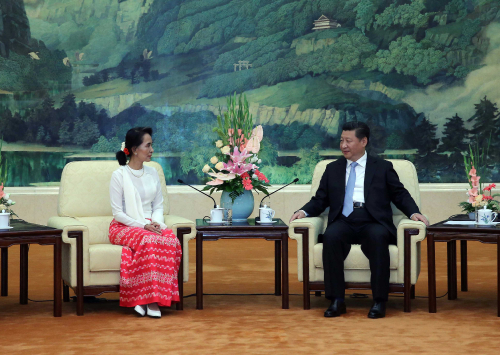 |
|
Xi Jinping, General Secretary of the Central Committee of the Communist Party of China, meets with Aung San Suu Kyi in Beijing on June 11 (XINHUA) |
Aung San Suu Kyi, the renowned social activist and Chair of the National League for Democracy (NLD), Myanmar, paid her first visit to China from June 10 to 14 at the invitation of the International Department of the Communist Party of China.
As she is Myanmar's opposition leader, observers have labeled Suu Kyi's Beijing trip as historic and indicative of a flourishing in relations between the two countries.
"Since Myanmar adopted its new Constitution a few years ago, the country has generally achieved national reconciliation, providing new space for in-depth development of bilateral relations between China and Myanmar," said Shi Yongming, a senior researcher on Asian studies with the China Institute of International Studies. "Previously, bilateral relations had been limited to governmental levels, but have now been expanded into a multi-faceted relationship."
As a popular political figure in Myanmar, Suu Kyi's Beijing visit has attracted much attention among observers of China-Myanmar relations.
Shi told Beijing Review that Suu Kyi's visit did not actually come as a surprise. "It was only a matter of time."
Suu Kyi has openly expressed her intention to visit China many times in the past and has maintained close contact with the country. When she was young, she visited the Chinese Embassy in Yangon many times with her mother, who was then a diplomat. Suu Kyi said she still has the gifts that late Chinese Premier Zhou Enlai gave to her family.
Since the political leader was released from house arrest in 2010, the then Chinese ambassador Li Junhua and the current Chinese ambassador Yang Houlan have all met with Suu Kyi several times.
Post captivity, Suu Kyi resumed her political career, becoming a parliamentarian by winning a by-election in April 2012. She became a parliament member of the House of Representatives and chairwoman of the House's Committee for Rule of Law and Tranquility.
Observers have claimed that Suu Kyi has a very thorough understanding of the special bond between China and Myanmar. She once famously made an analogy contrasting the "special" relationship between the two countries with that between a husband and wife. Unlike a married couple, who can always get a divorce should they not get along, nothing can be done to change the fact that China and Myanmar are each other's neighbors.
When the China-Myanmar joint Letpadaungtaung copper mine project met with protest from local villagers, Suu Kyi was the voice of reason when it came to defending the project, which is of undoubted benefit to both countries.
Song Qingrun, a researcher on Southeast Asian studies with the China Institutes of Contemporary International Relations, said that as Myanmar is undergoing social transformation, bolstering party-to-party and people-to-people exchanges is very important to China-Myanmar relations.
For instance, Song said, Myanmar's cooperative ventures with China requires the approval of Myanmar's parliament, but the views of the opposition party, media and common people all hold sway over the policies of the Myanmar Government as it needs to show fidelity to public opinion.
Shi told Beijing Review that the visit could potentially strengthen communication and understanding between the two parties, adding that Suu Kyi may bring back her objective impressions of China and share them with Myanmar's people.
In addition, observers have noted that as the NLD may play a larger role in the running of Myanmar, given the country's upcoming general election in November, Suu Kyi's visit may well further her party's understanding of China, which may contribute to greater cooperation as well as putting an end to border confrontations.
Since the beginning of the year, the government of Myanmar has been fighting rebels in its eastern Kokang region, which borders China's Yunnan Province. A number of Yunnan residents perished in March when a Myanmar aircraft dropped a bomb on a sugarcane field. China has urged all parties concerned to restore stability and order to the border area as soon as humanly possible.
Copyedited by Kieran Pringle
Comments to yulintao@bjreview.com
